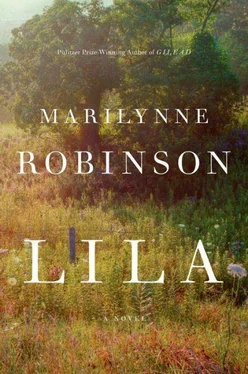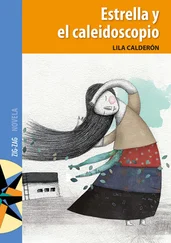So she started copying again. And the Spirit of God moved upon the face of the waters. And God said, Let there be light: and there was light. And God saw the light, that it was good: and God divided the light from the darkness. And God called the light Day, and the darkness he called Night. She wrote it out ten times. If she could make herself write smaller, she wouldn’t fill up the tablet for a while. She wrote Lila Dahl, Lila Dahl, Lila Dahl. The teacher had misunderstood somehow and made up that name for her. “You’re Norwegian! I should have known by the freckles,” she said, and wrote the name down on the roll. “My grandmother is Norwegian, too,” and she smiled. At supper, when Lila told her what had happened, Doll just said, “Don’t matter.” That was the first time she ever thought about names. Turns out she was missing one all that time and hadn’t even noticed. She said, “Then what’s your last name going to be? ’Cause it can’t be Dahl, can it?” and Doll said, “That don’t matter, either.”
She couldn’t keep the Bible and the tablet in her suitcase, because that was the first thing anybody would steal. Her bedroll would be the second thing. She had put the money she was saving in a canning jar under a loose floorboard, but it was too dirty down there for anything else. It was really just the clumsiness of the writing she wanted to hide, because she thought, What if he saw it? Then she thought, That’s what comes of spending all this time by myself. So she set them on top of the suitcase, thinking a thief would probably just clear them off there and leave them lying on the floor, since they weren’t worth anything. And anybody who would steal from her was probably twice as ignorant as she was and wouldn’t take any notice of them anyway.
The thought came to her that very morning. Why was she always walking into Gilead? There were farms around. One of them must need help. Anyone who saw her could tell she was used to the work. Those folks in Gilead knew her too well. She was tired of it. And when she asked herself that question and answered it — No good reason — she felt as though she had put a burden down. It used to be when they were with Doane and Marcelle and they had to pass through a town, they’d clean up the best they could first, and then they would walk along together, looking straight ahead, as if there could not be one thing in the whole place that would interest them. Town people thought they were better. They all knew that, and hated them for it. Doane or Marcelle might go into a store to buy a few things they needed and a little bag of candy or a jar of molasses, but the rest of them just kept walking till they were out in the country again. Somehow Mellie would have figured out hopscotch, never seeming to watch the girls that were playing at it in the street, and that would be all she and Lila thought about for days afterward. They left a trail of hopscotch behind them, Mellie always thinking of ways to make it harder. They’d be jumping along in the dust, barefoot, with licorice drops in their mouths, feeling as though they had run off with everything in that town that was worth having.
Walking into Gilead, she felt just the way she had felt in those days, except now she was alone. Doane used to say, We ain’t tramps, we ain’t Gypsies, we ain’t wild Indians, when he wanted the children to behave. She asked Doll one time, What are we, then? and Doll had said, We’re just folks. But Lila could tell that wasn’t true, that there was more to it anyway. Why this shame? No one had ever really explained it to her, and she could never explain it to herself. Thou wast cast out in the open field. All right. That was none of her doing. She had worked herself tough and ugly for nothing more than to stay alive, and she wasn’t so sure she saw the point of that. Why did she care what people thought. She was nothing to them, they were nothing to her. There really was not a soul on earth she should be worrying about at all. Especially not that preacher. Doll would be glad to see her no matter what. Ugly old Doll. Who had said to her, Live. Not once, but every time she washed and mended for her, mothered her as if she were a child someone could want. Lila remembered more than she ever let on.
Those thoughts. Still, she would go down the road until she saw a farmstead, and then she’d just look for someone to talk to and ask. Simple as that. And she’d take some sort of hard work that would wear her out, and then she’d sleep. No dreams and no thinking. No Gilead.
And things did turn out well enough. At the first house she went to there was an old farmer with a sickly wife and a son in the army. There was nothing they didn’t need help with. They told her right away that they didn’t have much money, and she told them she didn’t expect much, so that was all right. It took her most of the day to clean up the kitchen. She would have liked to work outside, but the woman said she’d always taken pride, and now with her health gone bad on her — so Lila scrubbed it clean, every inch of it. And she did some of the wash, in the yard, at a silver metal tub on two sawhorses. She had a big brown block of homemade soap and a washboard, and she had to heat water on the kitchen stove and carry it outside. It did wear her out. She could hardly lift her arms to pin the clothes to the clothesline. The wash would have to stay on the line overnight, but there was no sign of rain and so much wash to do that she had to make a start on it.
She was back the next morning. The farmer had brought in eggs for their breakfast, and there was ham. They told her she had answered their prayers, and what was she supposed to say to that? After a few days they gave her a ten-dollar bill and a plucked chicken and a decent pair of shoes. And they said they were pretty well out of money until they got a check from their son, who was sometimes a little late with it but almost never forgot. And they gave her a carpetbag with some old clothes in it. So that’s the end of that, she thought. Well, it ain’t the only farm.
There was a red blouse in that carpetbag. It looked almost new. It had long sleeves and a collar and a ruffle down the front. Never in her life before had she worn anything bright red. As soon as she took it out, as soon as she had tried the length of a sleeve against her arm, she decided she might as well take a day off tomorrow and go over to town, maybe with ten dollars in her pocket, just for the feeling of having a little money. Tired as she was, she didn’t sleep. She bathed in the river in the morning dark, then she sat in the doorway waiting for enough light to let her do her copying. And there was evening and there was morning, one day. She didn’t feel like spending much time on it. But she did write it out again and again, as she always did. Lila Dahl, Lila Dahl. Practice. And then she fell asleep. She had been sitting there in the morning sunlight when a sweet weariness came over her, and she had to lie down just for a little while. When she woke up the sun was high, the day half gone. But it is hard to regret sleep like that, even though it was looking forward to the day that had kept her awake all night. She combed out her hair and put on Mrs. Graham’s skirt and the red blouse.
At the store she bought some threepenny nails so she’d have a way to hang things up if she wanted to. The one nail someone else had put in a wall had that chicken hanging from it by the twine around its drumsticks. She’d roast it when she got home. She bought a box of matches. A can of milk. Then she thought she might walk past the church. There was a hearse idling there, and just as she was about to go by, the church doors opened and a coffin came out, four men carrying it, easing it down the stairs. Then the preacher came out after it, his black robe fluttering in the breeze, his Bible in his hands, his big, heavy old head bowed down. She knew it must be some friend of his who was dead. He had so many, one of them was always dying. The men slid the coffin into the hearse, but the preacher glanced up and saw her there and stopped where he was, on the step. The mourners stopped behind him, weeping, and not quite sure what to do, since they seemed to think they shouldn’t step around him. So they wept and hugged each other, and he just stood there, looking at her. The look was startled. It meant, So you’re here, after all! How could you let me think you had left! As if there was something between them that gave him the right to be hurt, the right to be relieved. And she hadn’t even missed church lately. So he was aware of her all the other days, knew somehow that she was close by, or that she was not, and it grieved him that she had been gone from Gilead even a little while. The widow or the mother or whoever she was said a word to him, and he nodded and went on. She saw him standing near the hearse, holding the mourners’ hands, touching their arms, murmuring to them. What do you say to them, she thought, when they stand around you like that, like they just need to hear it, whatever it is? I want to know what you say. She couldn’t walk up to them, stand there with them hearing the words he whispered, waiting for him to touch her hand. She didn’t even have much to cry about. That woman put her head on his shoulder, sobbing, and he put his arm around her and held her there. He pushed her hair away from her face. Lila blushed to think how good it must have felt to her, to rest her head that way.
Читать дальше












